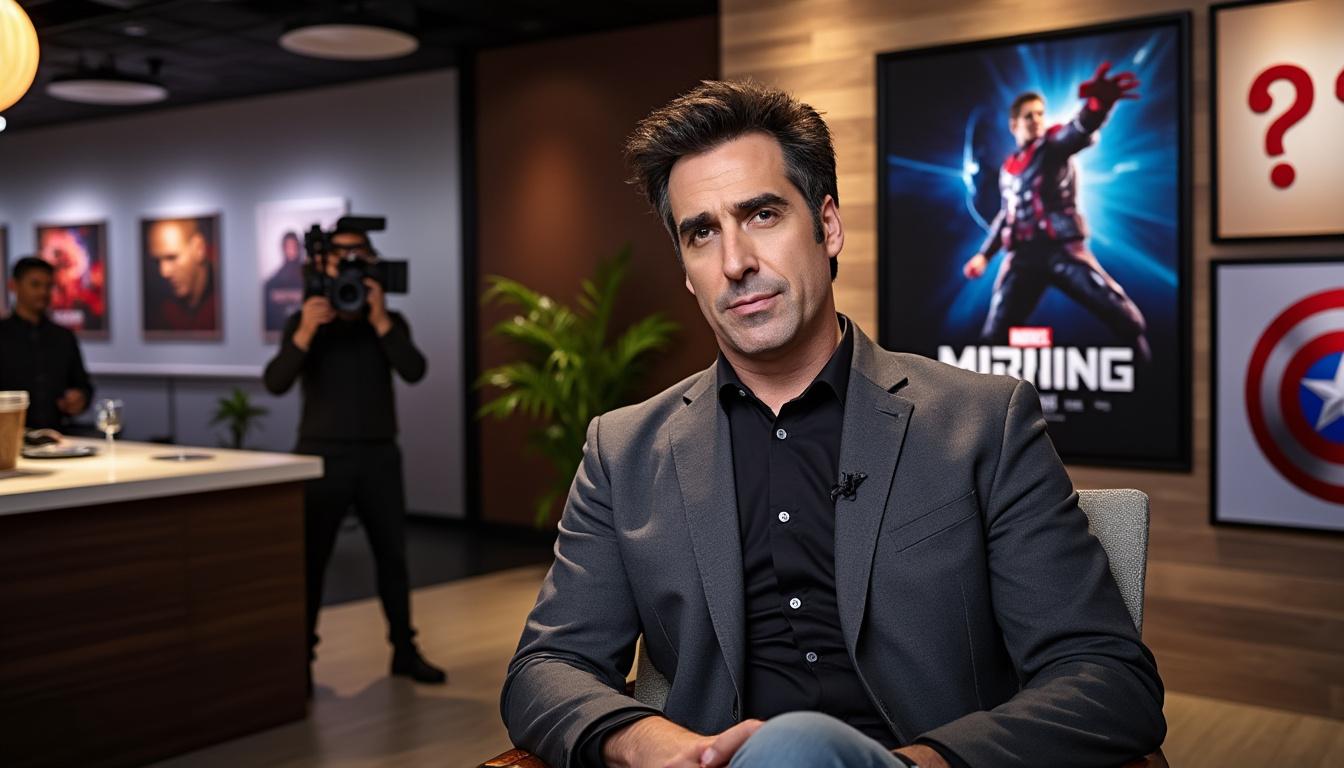Sacha Baron Cohen has recently unveiled details regarding his surprising role in the Marvel Cinematic Universe (MCU), stirring excitement among fans and adding yet another layer to his already diverse career. Known for his outrageous comedic characters in films like “Borat” and “Bruno,” his transition to a more serious role in superhero cinema is nothing short of intriguing. In the final episode of the Disney+ series “Ironheart,” Cohen emerges as one of the most notorious villains from the comic book world: Mephisto. With anticipation surrounding this character’s debut, the implications for storytelling within the MCU have taken a significant turn.
Sacha Baron Cohen’s Mephisto: A New Era in the MCU
The long-anticipated introduction of Mephisto, portrayed by Sacha Baron Cohen, marks a groundbreaking moment in the MCU. Fans have speculated about this character’s potential appearance in various Marvel projects, dating back to the much-discussed “WandaVision.” Despite the absence of Mephisto in that series, his arrival in “Ironheart” feels like an essential piece of the puzzle that connects various plot threads across the Marvel universe. Surprising audiences, Cohen’s character is not just an entertaining cameo; he is positioned as a key figure in the evolving dynamics of the MCU.

The finale of “Ironheart” takes viewers on a thrilling ride as Riri Williams, played by Dominique Thorne, grapples with a revelation that Cohen’s character, initially perceived as the dark cosmic entity Dormammu, turns out to be the devilish Mephisto. This twist not only elicits shock and elation from audiences but also underscores the duality of heroism and villainy present throughout comic storytelling. The layers of character development and intricate plotting have always been hallmarks of Marvel films, and Cohen’s interpretation of Mephisto elevates this complexity. What does this mean for the character going forward, and how will his presence shape future narratives in the MCU?
The Anticipation and Speculation Surrounding Mephisto’s Debut
The lead-up to featuring Mephisto in the MCU has been filled with fervent fan theories and expectations over the last few years. The anticipation escalated when it was suggested in various discussions that Cohen might be cast as this iconic figure. As fans delved into the rich lore of Marvel comics, they pored over the implications of introducing a character synonymous with trickery and manipulation.
- Mephisto and Comic Lore: Mephisto is often depicted as one of the primary antagonists in Marvel comics, known for his gifts that come at a steep personal cost to the heroes. His cunning nature and ability to manipulate events make him a formidable foe for any superhero.
- Expectations from “Ironheart”: The series was expected to explore new horizons within the MCU, tackling themes relevant to a younger generation while continuing the stories of its established heroes.
- Casting Decisions: The choice to cast Cohen, whose previous roles have been diametrically opposite to the villainous Mephisto, signals Marvel’s willingness to take creative risks and further expand their storytelling horizon.
The show’s creators, including executive producer Ryan Coogler, revealed insights into the decision-making process for introducing Mephisto, and how they strategically chose Cohen to embody this character. His comedic background tilted towards the absurd conveniently lays a foundation for a more nuanced portrayal, where humor intertwines with malice. This character’s introduction opens up an array of storytelling opportunities that can weave humor, horror, and the dramatic element that comic book narratives often embody.
| Character | Portrayed By | First Appearance | Significance in MCU |
|---|---|---|---|
| Mephisto | Sacha Baron Cohen | 2025, Ironheart finale | Anticipated as a major villain connected to numerous MCU plotlines |
| Dormammu | Benedict Cumberbatch | Doctor Strange (2016) | Served as a cosmic threat, introductory to magic in the MCU |
| Thanos | Josh Brolin | The Avengers (2012) | Infinity Saga’s primary antagonist, merging various hero narratives |
Character Development and Storytelling in Marvel
The introduction of Mephisto is part of a larger trend within the MCU that focuses on deepening character arcs and expanding storytelling complexity. Marvel has long championed the idea that even the most malevolent of characters can possess layers of depth. The intersection between heroism and villainy serves to humanize characters, allowing audiences to engage with them on a more emotional level.
As the Marvel film industry evolves, these character developments become integral to the overall storytelling approach. Each character’s journey is crafted with precision, and the integration of Mephisto into the “Ironheart” narrative indicates the supporting role which villains play in enhancing protagonists’ arcs.
- Narrative Depth: The characterization of Mephisto carries implications that allow for thematic exploration of morality, temptation, and sacrifice.
- Interconnected Storylines: Mephisto’s involvement suggests that future Marvel stories, such as upcoming films and phases, may reflect back on choices made by characters in “Ironheart.”
- Balance of Tones: The intertwining of humor and darkness, as exhibited in Cohen’s portrayal, emphasizes the versatility of storytelling methods in the MCU.
Narratives within comic-book adaptations thrive on the dual stakes of physical battles combined with moral dilemmas. Cohen’s Mephisto has the potential to embody these themes, adding a sinister yet playful tone to the MCU’s diverse palette. His presence in the series will likely lead to unexpected alliances and confrontations of ideology, fundamentally reshaping the heroes’ journeys.
The Role of Humor in Cohen’s Mephisto
Cohen’s unique brand of humor, often characterized by absurdity and unpredictability, brings an intriguing twist to the character of Mephisto. Fans are wondering how this comedic edge will complement the character’s often sinister motivations. A careful balancing act must be performed, ensuring that while the humor may offer levity, it does not undermine the threat that Mephisto embodies.
Cohen has often expressed that humor can often act as a vehicle for deeper themes, a sentiment that aligns perfectly with the compelling narratives inherent in comic adaptations. The collaboration between humor and storytelling may pave the way for surprises in future MCU projects. “Ironheart,” as a medium, serves as a testbed for exploring the intersectionality of these themes.
Future Implications for the MCU with Mephisto
With Mephisto officially making his entrance into the MCU, fans are eager to discuss the character’s implications for future story arcs and how he might intertwine with existing heroes and villains. As one of the most controversial yet fascinating figures in the Marvel Comics universe, Mephisto has the potential to reshape the landscape of upcoming storytelling.
Discussion about character integration and narrative dynamics is already brewing among fans. Speculation surrounds potential interactions between Mephisto and heroes such as Doctor Strange or Spider-Man, both of whom have a rich history with the demonic figure.
- Collaboration with Heroes: Mephisto’s dealings often lead to complex alliances with heroes for personal gain; exploring these dynamics could keep fans engaged.
- Possible Crossovers: Imagining how Mephisto may connect with villains like Thanos, or upcoming characters in the MCU, pushes the narrative boundaries.
- Thematic Exploration: Future projects may delve deeper into moral complexities, weaving cautionary tales through Mephisto’s encounters with heroes.
The ways in which Cohen’s Mephisto interacts with the existing Marvel canon raises important questions about ethical dilemmas in storytelling and the evolution of character arcs. For viewers, this introduces possibilities that link back to crucial events in larger narratives and invite speculation about how the MCU will continue to redefine its hero-villain dynamics.
| Character Interactions | Potential Outcomes | Future Projects Involved |
|---|---|---|
| Mephisto & Doctor Strange | Moral conflict leading to possible alliances or confrontations | Doctor Strange in the Multiverse of Madness sequel |
| Mephisto & Spider-Man | Negotiations that may affect Peter Parker’s reality | Spider-Man 4 and beyond |
| Mephisto & The Avengers | Team dynamics tested through tricky moral choices | Next Avengers Assemble film |
The Cultural Impact of Sacha Baron Cohen’s Mephisto
As Cohen steps into the role of Mephisto, the cultural implications extend beyond just the MCU. The blend of comedy and villainy highlights a current trend within cinema, wherein multi-dimensional characters are not only developed, but embraced. The public’s reception of Cohen as a villain will shape future casting decisions for iconic characters, thereby impacting audience expectations.
Moreover, the conversation surrounding representation—in this case, a comedic actor transitioning into a darker role—could serve to open doors for more innovative interpretations of classic comic characters. Cohen’s career path encourages a dialogue on the malleability of actors and their capability to transcend traditional genre boundaries. Viewers may expect to see how this kind of bold casting choice may alter the casting landscape in cinema.
With Cohen now becoming a significant part of the Marvel narrative, the ripple effects of this casting will likely resonate across the entertainment industry, influencing future content and character portrayals for years to come.


